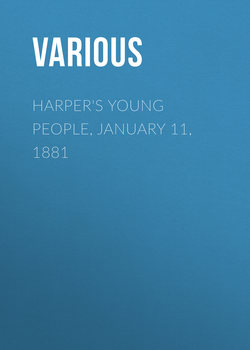Читать книгу Harper's Young People, January 11, 1881 - Various - Страница 3
A HERO OF CHIVALRY
ОглавлениеBertrand du Guesclin was born in 1314 at the castle of Motte Broen, near Rennes, in Brittany. His heroic character showed itself early. As he was not troubled with lessons (he never learned to read or write), he formed a company of boys of his own age, and, acting as their general, practiced them in battle and combat. His mother often clasped her forehead in alarm when he came home with bruised face and bleeding head. Even in his seventeenth year he excelled many older knights in strength and dexterity in the use of arms. But he was ridiculed by the ladies because he looked so ugly, and rode such a wretched horse. They jeered at him, saying that he looked more like a donkey-driver than a knight and nobleman, and that he must have borrowed his steed from a miller.
Bertrand was indignant, and, as there was another tournament about to come off, he begged a cousin of his to lend him a steed and armor. Both were granted, and with a joyful heart he entered the lists, where, in his strange armor, and with his visor down, no one, not even his own father, recognized him. A well-known valiant knight opposed him. The signal was given, they ran at each other with lightning speed, and with a loud crash their lances broke into splinters in their hands. Bertrand, however, had struck with such force on his adversary's helmet, that the latter was thrown from the saddle to a distance of several paces, where he lay insensible on the sand, and had to be carried out of the lists.
The young victor returned to his post with a fresh lance, and waited for fresh opponents. Now his own father ranged himself against him. Bertrand did not wish to fight against him, but was equally unwilling to make himself known. So he resolved to lower his lance in his tilt, and to receive his father's blow on his shield without making a counter-thrust. He did this so adroitly that he kept firm in his saddle, and, without tottering, galloped by, and then declared positively that he would not fight again with that knight. People were surprised, but made no derisive remarks, for the knight's courage had been sufficiently proved in the former combat. His father rode out of the lists, and gave place to other knights. Guesclin laid them in the dust, and was unanimously declared the winner.
Every one was eager to know who the champion was, and his father especially longed for the unravelling of the mystery.
At length, when the tournament was over, and Bertrand had received his prize, he rode up to his father, raised his visor, and cried, "Do you know me now, father?" The old man embraced him with tears of joy, and at once provided him with a steed and armor. The fame of the young hero now spread all over France.
Hitherto Bertrand had only won victories in tournaments, but now the more serious field of battle was to behold the first exploits of his sword. Duke Charles of Blois made war on John de Montfort for the possession of Brittany. Philip the Sixth, King of France, sided with the former; while, on the other hand, the King of England (Edward the Third) supported De Montfort. Bertrand had naturally no choice in the matter, for, like a brave Frenchman, he followed his king wherever he led him.
At that time the castle of Fougeray was in the hands of the English, and Bertrand resolved to take it from them, as it was a place of no mean importance. With this view he disguised himself and sixty companions as wood-cutters, and divided them into four bands, which approached the place from different sides. He then fixed on a time when the governor of the castle and a part of the garrison had gone out on a reconnoitring expedition, when he made a party of his men hide themselves in the neighboring wood during the night. At break of day they loaded themselves with fagots and brushwood, concealed their weapons under their clothes, and came up to the castle from different directions. Bertrand, in a white smock, with a heavy load of wood on his back, was the first to appear before the draw-bridge, which was instantly lowered for him. He at once threw down his fagot, drew his sword, and transfixed the warder; then he raised the cry of "Guesclin." At this signal the rest hastened forward to come to his assistance and take the bridge. As, however, there were two hundred Englishmen in the castle, the conflict was very unequal, and a horrid slaughter ensued. An Englishman clove the skull of one of Bertrand's companions with his battle-axe. Guesclin, in return, cut him down, and caught up the axe, with which he dealt slashing blows on every side. So he fought on, and kept the enemy off the body for a time, until a troop of cavalry of his own side accidentally arrived in the neighborhood, rescued him from his perilous situation, and helped to take the place. It was, indeed, high time for relief to arrive; for, in his combat against tenfold odds, he had dropped his battle-axe, and his head was so covered with wounds that the blood was streaming down his face. The conspicuous valor which he here displayed gained him the reputation of being the boldest and most dauntless knight of his time.
[Begun in No. 58 of Harper's Young People, December 7.]
